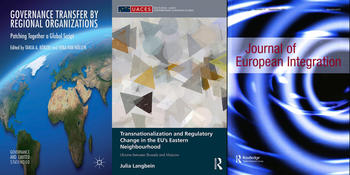New Releases: Books & Special Issue by KFG Fellows
Apr 20, 2015
The following books and special issues by KFG fellows have been published lately:
"Governance Transfer by Regional Organizations. Patching Together a Global Script", edited by Tanja A. Börzel and Vera van Hüllen;
"Transnationalization and Regulatory Change in the EU’s Eastern Neighbourhood. Ukraine between Brussels and Moscow", by Julia Langbein
"Responses to the 'Arabellions': The EU in Comparative Perspective", edited by Tanja A. Börzel, Assem Dandashly and Thomas Risse
"Governance Transfer by Regional Organizations. Patching Together a Global Script", edited by KFG research director Tanja A. Börzel and Vera van Hüllen, explores the conditions under which regional organizations engage in governance transfer in and to areas of limited statehood. The comparison of 12 regional organizations in Africa, the Americas, Asia, Europe and the Middle East shows that regional organizations have not only institutionalized commitments to human rights, democracy, the rule of law, and the fight against corruption. They have also developed more detailed prescriptions of these 'good' governance standards and established similar instruments to promote and protect them in their member states.
In "Transnationalization and Regulatory Change in the EU’s Eastern Neighbourhood. Ukraine between Brussels and Moscow" Julia Langbein examines why regulatory reforms in the EU’s Eastern neighbourhood countries are happening despite the presence of domestic veto players who favour the status quo, the lack of EU membership perspective and the presence of Russia as an alternative governance provider.
A special issue of the Journal of European Integration with the title "Responses to the ‘Arabellions’: The EU in Comparative Perspective" has been edited by Tanja A. Börzel, Assem Dandashly and Thomas Risse. It particularly looks at the balancing act by external actors between their desire for stability, on the one hand, and their normative principles toward human rights and democracy, on the other. The authors compare the actions (and inaction) of the European Union (EU) with other international and regional players, including the United States, Russia, Turkey and Israel.


